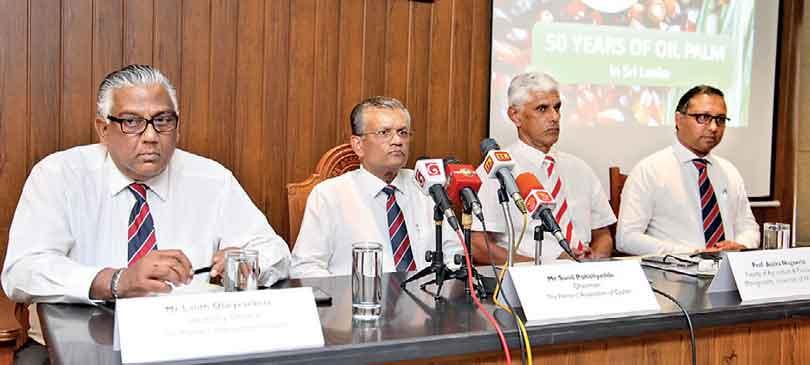25 Jul 2019 - {{hitsCtrl.values.hits}}

From left: PA Secretary General Lalith Obeysekera, PA Chairman Sunil Poholiyadde, Wayamba University Agriculture and Plantation Management Faculty Prof. Asoka Nugawela and Watawala Plantations PLC Chief Executive Officer Binesh Panawla
Pic by Damith Wickramasinghe
Sri Lanka’s Regional Plantation Companies (RPCs) are growing impatient over President Maithripala Sirisena’s policy indecisiveness on oil palm cultivation, as Rs.400 million worth of nursery-stage oil palm plants are about to go into waste.
Planters’ Association of Ceylon (PA) Secretary General Lalith Obeysekera yesterday told reporters in Colombo that despite the recommendation of the National Economic Council and several other committees, the president is yet to make a decision regarding the fate of the oil palm plantations in the country.
“The president’s approval is required to move forward with planting of oil palm plants at our nurseries,” he said.
PA Chairman Sunil Poholiyadde noted that the RPCs imported and planted oil palm in their plantations with the permission of the government and required government bodies.
The previous regime approved the RPCs to plant oil palm in 20,000 hectares in areas identified over a strategic Environmental Assessment study.
The RPCs imported the required viable oil palm seeds under the approval of the Plantation Ministry. However, the RPCs have so far only been able to plant those in 11,000 hectares after reaching the nursery stage, while the remaining plants still sit idly in nurseries.
“These plants are about two years old and certain plants are flowering. Even right at the moment, these plants are overgrown. Immediate action is needed to be taken to plant these plants,” Wayamba University of Sri Lanka Agriculture and Plantation Management Faculty Prof. Asoka Nugawela said.
Watawala Plantations PLC Chief Executive Officer Binesh Panawla revealed that planting these remaining crops almost has come to a halt, following the public protests instigated by certain parties over last several years.
“When the public protest, the police comes into the scene and asks us to planting oil palm until there’s a clear policy decision on oil palm by the government,” a PA official said.
Prof. Nugawela claimed that certain NGOs and groups with vested interests are instigating public by spreading disinformation on oil palm.
While noting that Sri Lanka currently imports 180,000-200,000MT of edible oil per annum, which is worth of Rs.30 billion, Panawla pointed out that Sri Lanka could save a significant amount of foreign exchange by allowing RPCs to continue with their oil palm planting plans.
Prof. Nugawela highlighted that the Indian government led by Prime Minister Narendra Modi has taken a courageous decision to plant two million hectares of oil palm in India to reduce the reliance on foreign imports.
“Having realised the benefit of this crop and having indentified the need for this crop in India, The Modi government is going ahead with an ambitious oil palm planting programme to plant two million hectares of oil palm over the next few years. But, we are still struggling to plant 20,000 hectares of palm oil in Sri Lanka,” he elaborated.
He further alleged that the Central Environmental Authority (CEA) published a draft report titled ‘A Study to Identify Environmental and Social Issues of Oil Palm Cultivation in Sri Lanka’, despite the objections by a majority of the study team on the observation and recommendations in the report.
Four members of the seven-member study team have refused to sign the report.
The report, which was published on the CEA report, recommended that the establishment of new plantations, expansion of existing plantations and re-plantation of oil palm should be discontinued in Sri Lanka.
Prof. Nugawela noted that the CEA has misinterpreted several research findings in other countries to back their observation and recommendations in the report.
“There are maybe certain parties who benefits from importing palm oil to the country,” he said.
Poholiyadde noted that there’s no legal basis for halting RPCs from planting oil palm in the plantations as the government issued no circular or any directive banning such activities.
Further, he said that under the lease agreement signed between RPCs and the government, the RPCs have given the full discretion to diversify into other crops.
“We still haven’t gone there; we expect the government to resolve this,” he responded when queried whether the RPCs would pursue legal action.
The RPCs also face uncertainty over the future of 50-year-old oil palm industry in the country as the government authorities refused to allow import of oil palm seed for replanting purposes.
Poholiyadde said that due to the changing weather patterns, dwindling rubber prices and shortage of rubber tappers, the oil palm plantations are crucial for the sustainability of Sri Lanka’s plantation sector.
The RPCs have estimated to have invested Rs.15 billion on the palm oil industry for its mills and cultivation. (NF)
15 Nov 2024 3 minute ago
15 Nov 2024 24 minute ago
15 Nov 2024 37 minute ago
15 Nov 2024 49 minute ago
15 Nov 2024 1 hours ago